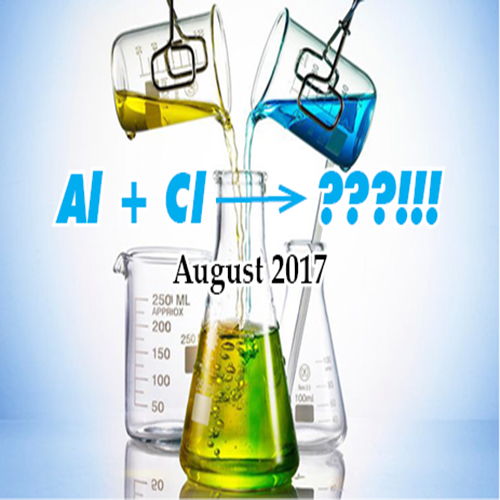The Chemical Industry (CI) is perhaps unique in the very high degree of automation it has incorporated, particularly in industries with high complexity like refineries and petrochemicals. A lot of this automation with powerful software driven controls mimic near intelligent operations. And more are on the way with the advent of robotics and Industrial Internet of Things (IIoT).
A very potent intelligent force is in the making, bandied about as AI or simply Artificial Intelligence. AI systems, the author warns should not be confused with ‘mere’ automation. As much as it could have manifold benefits, it has dreadful dangers too as it borders on ‘thinking like humans’ – and therein, ironically enough, lies the danger. Read this well articulated opinion on AI and above all lets debate. Please send us your views on AI to the email provided at the end of this.
AI + CI→???!!!
Space Odyssey 2001, a cult sci-fi film of 1968 by Stanley Kubrick, describes a journey to Jupiter. HAL, a computer onboard the spaceship has intelligence to take decisions. In a spine-chilling finale, HAL decides that humans are a threat to its mission and plans a clever stratagem to do away with the crew. This is the kind of “artificial intelligence” that the noted sci-fi writer Arthur C Clarke envisioned more than 5 decades ago. Today “Artificial Intelligence” has been reduced to AI and bandied about in many unintelligible ways. AI has become a buzzword and interchangeably intermixed with Robotics and Internet of Things (IoT). Robotics and IoT are tools of convenience; AI is far more. Robots and machines on IoT perform as per the way we humans program
them. AI systems think for themselves and may perform actions that we don’t expect them to. We don’t program AI systems; we teach them to think for themselves, just as we do. Intrinsic in this is our acceptance of the limitations of human brain; both its size and speed of information processing.
Learning
How does the human child learn? It starts by observing others and learns to recognise patterns. This is further reinforced by a set of instructions, both formal and informal, respectively from schools and family. These instructions attempt to weed out undesirable patterns. AI systems are taught in the same way. They are exposed to a vast amount of data from which they seek out patterns on their own without human influence. Armed with this “intelligence” AI systems are expected to take decisions in a new situation. Are we ready to accept such decisions? Are we ready to accept the outcomes of these decisions, even without knowing what the decisions are? Probably not! This is the scenario that Stephen Hawking, Bill Gates and Elon Musk, three most intelligent inhabitants of the digital universe are warning us against.
Automation
What inroads will AI make into the chemical industry? The degree of automation in the chemical process industry is already very high. Control algorithms are getting sophisticated and the response times are becoming shorter. Advanced and predictive control systems are allowing plants to be operated very close to the theoretical efficiency. Feed-Forward control systems allow process parameters to be adjusted in anticipation of changes in the quality of raw material. Equipment fitted with smart sensors monitor and announce their health in real-time, thereby improving the plant reliability immensely. All these have become possible because of human intervention aided by computer technology and are not to be confused with AI.
Safety
Despite the high degree of automation, the chemical industry has been plagued by horrific accidents. The safety Guru, Trevor Kletz, in his seminal work – An Engineer’s View of Human Error – says that statistics support the view that as many as 90% of industrial accidents are due to human failing. Kletz then proceeds to catalogue various types of human error – error due to momentary lapse of attention, error due to improper training or instruction, error because the task is beyond a person’s ability, error due to noncompliance. All these four types of errors can be eliminated by a robust artificial mind that is intelligent and free of fatigue and emotions. “Zero Accident” can thus be a lofty goal for adopting AI in chemical industry.
Quality
Another area where AI can contribute immensely is quality. Many quality parameters are not possible to be measured online and need the intervention of a laboratory. The granulometry of a prilled product, for example. Or the Iodine Value of oil; or the opacity of a pigment. Any measurement in a laboratory is riddled with three problems: sampling error, contamination during sampling and timelag. Oftentimes, if the results are not as per expectation, there is no alternative but to recycle the product or label it as off-spec. Now compare this with the scenario in a kitchen, a veritable chemical plant, where quality requirements are equally stringent and complex, if not greater. Corrections to perceived shortfall in quality are instantaneous and intuitive in the kitchen. If AI systems be taught to replicate such actions in a chemical plant, laboratories will be rendered redundant.
Anticipation
E-commerce juggernaut Amazon patented “anticipatory shipping”, a system which helps them to predict what customers are going to buy before they actually order. Let us imagine a similar scenario in chemical industry. A fertiliser company manufactures 3 crop-specific product grades. The company’s product slate mirrors
the likely cropping pattern, which in turn is largely influenced by the rainfall prediction. Each year the company management plans to make the 3 grades in a proportion that is primarily determined by the long-term rainfall forecast issued by the meteorological department. Because the experts of the recommendation committee invariably fail to arrive at a consensus, the final decision is always a compromise of their subjective opinions. Farmers in turn do not rely completely on the forecasts put out, but supplement the information with their own gut feeling before deciding what to sow. An AI based system using historical inputs can be trusted to provide a more objective recommendation in this case. AI based system will help the company management to stay abreast with the farmer’s mind and improve its bottom-line. Such AI based production planning can be profitably adopted for most agrochemicals, whose consumption depends on nature’s vagaries.
Materials
It might take a decade or more for the AI scenarios described above to be turned into reality. The most immediate impact of AI is likely to be in the area of materials, more specifically on how materials are discovered and synthesised. Historically, scientists have stumbled upon new materials by accident. It has taken several years before their properties were fully understood and the material was put to commercial use. Graphene, touted as a wonder material, is still floundering 13 years after its discovery (Chemingineering, June 2017). AI is poised to turn around this process, putting application first and synthesis second. Material databases containing hundreds of thousands of compounds are now available. Properties of these “yet to be made” compounds are in the process of being predicted. AI based systems will zero in on a specific candidate in these databases to meet the required application. Such tailormade materials will rule our future in energy, healthcare, transportation and many other areas.
Readers’ responses may be sent to: k.sahasranaman@gmail.com or chemindigest@gmail.com
































